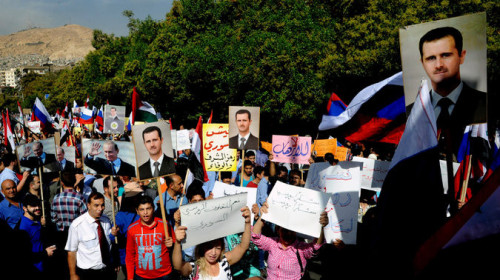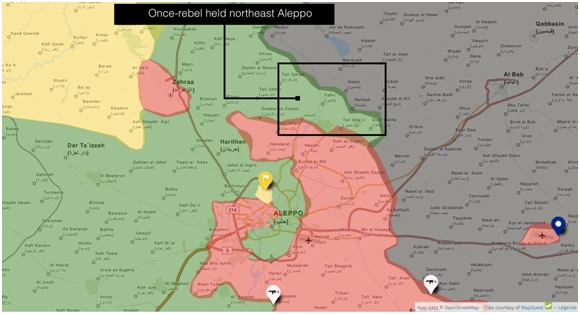PHOTO: A pro-Assad rally in front of the Russian Embassy in Damascus on Tuesday (SANA)
LATEST
- Rebel Commander Blames Disorganization, US for Aleppo Losses
- Ankara Blasts US for Sending Weapons to Kurds
WEDNESDAY FEATURE
Analysis: Understanding Putin’s Intervention
UPDATE 0900 GMT: Chatter is widespread on social media about the possibility of a renewed regime offensive in Jobar in northeastern Damascus and suburbs of the capital, following Russian and Syrian airstrikes:
#Syria: Many reports about very heavy shelling and beginning regime offensive on #Ghouta, #Damascus now. pic.twitter.com/OP7ewns6l4
— GEOrge (@ArtWendeley) October 14, 2015
Rebels pushed back today’s incursion into Jobar, killing more than 20 regime soldiers, according to a local source:
Other observers have noted that the attacks may be retaliation for two mortars that were fired upon the Russian Embassy in Damascus on Tuesday as a pro-Assad rally was taking place outside.
But the leading rebel faction Jaish al-Islam, based in Douma outside Damascus, has “categorically” denied responsibility for the mortar attack: “We do not carry out such attacks out of our ethical principles which insist on not targeting diplomatic missions or their headquarters.”
Jaish al-Islam said it “did not rule out” the possbility of the Assad regime staging the attack to win sympathy from the international community for its assault on rebels as a fight against “terrorism”.
ORIGINAL ENTRY: Claims circulated on Tuesday that the regime military and Russia, joined by Iran, will soon launch a larger offensive in northwest Syria.
The Syrian military, covered by intense Russian bombing of rebels, has been limited so far in its advance along three fronts in Latakia and Hama Provinces. On Sunday, it failed to move into Salma, a central rebel position in northeastern Latakia, and a day later it suffered a defeat, reportedly losing a commander and 50 troops, at Kafr Naboudeh in northern Hama.
While claiming some villages in both areas — as well as in the al-Ghab Plain in between — President Assad’s forces have failed to make a significant advance pointing towards the recapture of neighboring Idlib Province, claimed by rebels this spring. Meanwhile, three senior Iranian commanders and two from Hezbollah have been among the casualties.
Tuesday’s claims, fed in part by the correspondent of a Kuwaiti newspaper, said thousands of regime troops, Tehran-supported militia, and Hezbollah members were preparing to join the fight on the three fronts as well as a fourth in Aleppo Province. In addition, Iran’s Revolutionary Guards would put in ground forces, accompanying their commanders, for the first time.
“Two senior regional officials” — one “close to” the Assad regime — fed the reports of a push east of Aleppo city, where the Syrian military has taken territory from the Islamic State, either through victory or a withdrawal by the militants. The Assad regime has been hoping for months to lift the ISIS siege on Kweires airbase, and it also may move against rebels who have surrounded the enclaves of al-Zahraa and Nubl, north of Aleppo city.
One official told a Reuters correspondent in Beirut, “The big battle preparations in that area are clear. There is a large mobilization of the Syrian army …elite Hezbollah fighters, and thousands of Iranians who arrived in stages in recent days.”
The second official echoed: “The decision to launch the battle of Aleppo has been taken….It is no longer hidden that thousands of Iranians are now in Syria and their role is fundamental.”
A journalist for Al-Monitor even put out a photograph of General Qassem Soleimani, the commander of Iran’s elite Qods Forces, claiming to be from Latakia Province with regime troops. Other Iranian analysts said the picture was actually from Tehran with Iranian units.
The regime offensive began on October 7, a week after Russia launched its campaign of bombs, missiles, and cluster munitions, which has focused on rebel positions.
A regime barrel bomb on Salma in Latakia Province on Wednesday:
In Moscow, President Vladimir Putin turned on the US and its allies over their lack of cooperation with the Russian airstrikes.
Responding to the fact that Russia’s warplanes have carried out few attacks on their supposed target, the Islamic State, Putin responded:
Recently, we have offered the Americans: “Give us objects that we shouldn’t target.” Again, no answer. It seems to me that some of our partners have mush for brains.
Nevertheless, the Obama Administration offered Putin more reassurance on Tuesday, as spokesman Josh Earnest said that “countering Russia’s involvement in Syria does not rate nearly as high on the scale” as battling the Islamic State.
Russia and the US will hold a video conference after warplanes from the two countries came within 20 miles of each other and made visual contact over northern Syria on Saturday.
The US military’s spokesman, Colonel Steve Warren, said that two combat aircraft flown by the US and two flown by Russia “entered the same battle space”.
The consultation, by video conference, is the third since Russian airstrikes began on September 30. US Secretary of Defence Ashton Carter said he expected a deal “soon”, as he said Russia’s approach is “strategically short-sighted”.
“Even as we continue to disagree on Syria policy, we should be able to at least agree on making sure our airmen are as safe as possible,” Carter asserted.
US military spokesman Col Steve Warren said that two combat aircraft flown by the US and two flown by Russia “entered the same battle space” and were in visual contact with each other, the BBC reported.
Col Warren also said that Russian planes had repeatedly broken air patrols, coming close to unmanned US aerial vehicles or drones, but Russia has not responded to those allegations.
Rebels Announce Offensive on Hama City
Meanwhile, the rebels countered with their own headline claim. The Jaish al-Fateh coalition said that, having repelled the regime-Russian assault, it would soon launch its own offensive on Hama city with a 20,000-strong force, including 400 suicide bombers.
There was no confirmation of whether Jaish al-Fateh is moving on Syria’s fourth-largest city, or whether it may have put out the announcement to divert regime forces as the rebels attacked on another front.
Rebel Commander Blames Disorganization, US for Aleppo Losses
A rebel commander has blamed disorganization and lack of American support for a series of rebel defeats in Aleppo Province.
Rebels are caught between regime forces and the Islamic State, which has been fighting the opposition since January 2014 in northern Aleppo Province and has threatened to move on rebel positions inside Aleppo city.
Rebel areas in green between regime (pink) and Islamic State (grey):
Colonel Abu Rami al-Kurdi,a commander with al-Jabha a-Shamiya, said:
The myriad brigades under al-Jabha a-Shamiya’s umbrella in northeast Aleppo are bleeding men and hardware across multiple fronts — they’re caught between regime forces to the south, and IS to the north, not to mention skirmishing with the Kurds in Sheikh Maqsoud [in Aleppo city].
Add to this a complete lack of coordination between each brigade, and not nearly enough guns and cash from the Americans to compete with the much-better equipped Islamic State, and they had no choice but to withdraw from some 50km2 of the northeastern Aleppo countryside.
The Aleppo Victory Army’s Sharia Council denounced the “farcical retreat and withdrawal” of the “squabbling” rebel brigades. In a statement on Sunday, it threatened the dissolution of any factions failing to unite against what would be the regime’s “disastrous completion of the Aleppo siege”.
Civilians in Aleppo city have protested over the withdrawal and demanded the resignation of rebel leaders.
“These protests were brought about by the recent rebel setbacks in Aleppo, and the attacks that the Islamic State and the regime have launched,” Siham Afrad, one of the organizers, said on Tuesday.
Ankara Blasts US for Sending Weapons to Kurds
Turkish Prime Minister Ahmet Davutoğlu has lashed out at the US and Russia for supplying weapons to the militia of the Kurdistan Union Party (PYD) in northern Syria, as part of the effort to fight the Islamic State.
Turkey summoned US Ambassador John Bass to the Foreign Ministry on Wednesday, following Washington’s announcement that it is sending 50 tons of weapons to Kurdish fighters.
Davutoğlu told reporters on Tuesday that the weapons could be diverted to the Turkish Kurdish insurgency PKK, which has fought for independence for more than three decades:
We have expressed this to the U.S. and Russia in the clearest way. This is an issue of national security for us. Everybody perfectly knows how we take action when it’s about our national security, just like we did on the night of July 23, when we attacked the PKK and Daesh [the Islamic State].
“The aircraft delivery includes small arms ammunition to resupply local forces,” Pentagon spokeswoman Elissa Smith said on Wednesday, discussing a mission by a C-17 cargo plane.
Davutoğlu said Turkey will take all necessary measures in the event of any infiltration from Syria or the transportation of any ammunition “just like the Turkish army is doing in northern Iraq”.
“I want to announce this with clarity,” he added.


